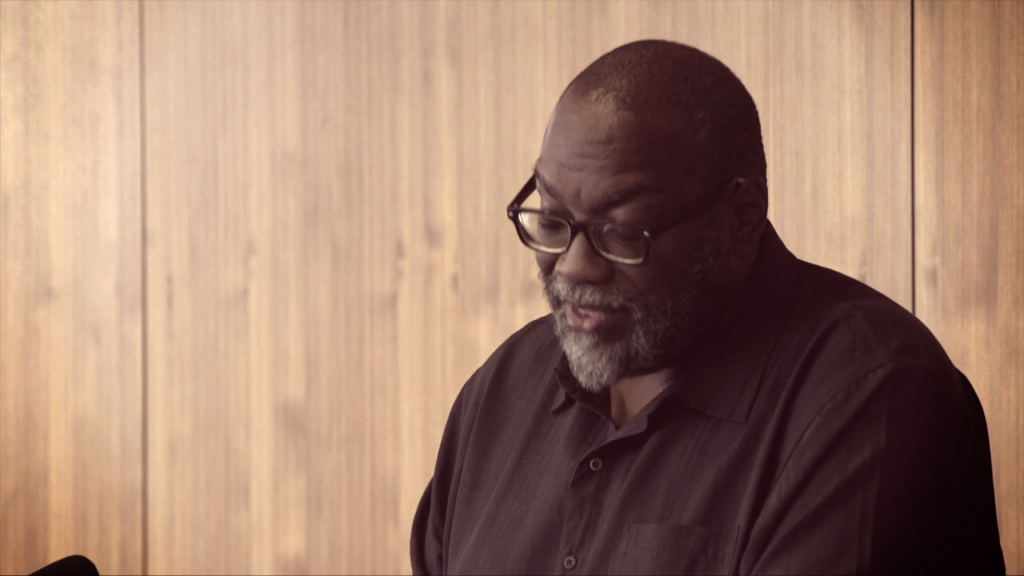“If we examine the process of ‘understanding’ people and ideas from the perspective of Western thought, we discover that its basis is this requirement for transparency. In order to understand and thus accept you, I have to measure your solidity with the ideal scale providing me with grounds to make comparisons and, perhaps, judgments. I have to reduce.”
Édouard Glissant, Poetics of Relation
The issue at the heart of the Martinican poet and philosopher Édouard Glissant’s Poetics of Relation has to do with how we relate to, read, and interpret others without reducing everyone and everything to a singular category or standard of experience. What Glissant had in mind was the colonial predicament in which black people had been rendered unintelligible, abnormal, barbaric, and therefore ripe for the forms of education, discipline, and control Westerners believed the situation called for.
In other words, black people had to be made legible. This making involved nothing less than the marshaling of white supremacy on a global scale, ranging from the disavowal of “alien” literatures and languages to the literal theft of land and bodies, on the grounds that Westerners had a paternalistic duty to spread the “germ of liberty” to those unschooled in the practice of self-government in the so-called democratic West.
In the aftermath of anti-colonial revolutions, Glissant saw how the shadow of this colonial Enlightenment project endured in the disciplining of difference. The view went something like this: in order for me to understand you, in order for me to be in solidarity with you, you must make yourself transparent to me; you must render yourself open to my standard of judgment. Against this view, Glissant defended what he called “the right to opacity.” As he later put it, “Why must I absolutely understand the Other in order to live next to him and work with him?”
The “absolutely” in Glissant’s formulation is important. What Glissant was suggesting is that it is not necessary to understand everything about the person or persons with whom we are in community. Through the practice of translation, we can come to a reasonably shared sense about what is to be done. We may not agree entirely and some of our experiences and claims may not translate over. But this is the point. We can indeed work out our shared goals while preserving our right to opacity as human beings.
Or so Glissant thought.
This view has most recently been challenged by Joseph M. Keegin at First Things, in a pithy review of Fred Moten and Stefano Harney’s 2013 book The Undercommons: Fugitive Planning and Black Study. Keegin argues that Moten’s opacity betrays the radical imperative he preaches.
The designation of Keegin’s essay as a review is a bit of a misnomer since Keegin spends scant attention to the key arguments that have made the book (criticisms notwithstanding) a philosophical force to be reckoned with by a new generation of scholars across the humanities and social sciences, both in the United States and beyond.
The essay is more about Moten than Harney. Keegin invokes Harney, mostly as an afterthought to support the claim that Moten is for the most part illegible, and then moves on. I think it’s right to detect a subtle racial politics here that suggests that a black author’s intellectual abilities are inferior to his white counterpart. But this is only half the story. It actually matters that The Undercommons is a co-authored book. It is a deliberate political choice on the part of Moten and Harney to challenge the individualized nature of study in the neoliberal university. By singling out Moten’s gifts (or lack thereof), Keegin plays into the processes of individuation that the co-authors critique so vigorously in The Undercommons.
Nevertheless, Keegin’s main point is that for all the talk in The Undercommons about scholarly fugitives in the underbelly of the neoliberal university—”maroon communities of composition teachers, mentorless graduate students, adjunct Marxist historians, out or queer management professors, state college ethnic studies departments, closed-down film programs, visa-expired Yemeni student newspaper editors, historically black college sociologists, and feminist engineers”—Moten himself is a poor exemplar of this fugitive tradition. His retreat into the world of abstraction places him atop a hierarchical structure he is otherwise in opposition to; his use of “obscure rhetoric” makes him more a bourgeois accommodationist to the status quo than a fugitive on the run.
As for the central concept of fugitivity, Keegin frames it in abstract theoretical terms, evading the co-authors’ material analysis of the neoliberal university. Adjunct lecturers perform a good bulk of academic labor and are poorly compensated, while graduate students at research institutions face a series of conditions including harassment and underfunding. Dissenting professors keep quiet on a whole range of subjects including abortion rights, Palestine, and increasingly, Critical Race Theory, lest they find themselves sanctioned or even jobless.
The neoliberal university is a fundamentally atomizing enterprise. It locks scholars into regimes of professionalization and is hostile to any collective organizing that seeks to regulate the university against its worst excesses. The neoliberal university is invested in war and more war—counterinsurgency at home and abroad. It remains a settler-colonial enterprise that continues to conscript students and their families, teachers and researchers, administrators and service contractors, bankers and speculators, corporate managers, and policy wonks, into its ruthless drive for financial growth and expansion.
The point is that we are not talking about a rosy utopia of freedom and togetherness. We are talking about an amalgamation of institutions that have built and continue to sustain themselves by reproducing inequality as a matter of course.
I think there is a legitimate conversation to be had about the usefulness of and over-reliance on theoretical abstraction in contemporary academic discourse—especially in a world where people on the receiving end of the university’s violence reach and yearn for a concrete set of organizing principles to do battle against it. Moreover, as Andrew Douglas and I have argued elsewhere, critique within the context of the university is too often ideologically and discursively radical without committing to the material projects that radical critique requires: the rematriation of indigenous land, refusing the reproduction of “academic accumulation,” exposing and resisting labor exploitation, and ultimately, abolishing the neoliberal university as such.
But Keegin is not much interested in what Moten has to say about this material project. For him, the standard against which he judges Moten’s radical politics is clarity of thought. “Instead of asserting hierarchies of value in clear language, he attacks hierarchies with obscure rhetoric.” In other words, if Moten has contradicted his fugitive vision on Keegin’s account, it would not be because of some story Keegin tells about ideological views he finds objectionable in Moten, or even his celebrity status. Moten’s poor syntax—his violation of the “requirement for transparency”—is the evidence Keegin marshals to render him at odds with the undercommons.
There are in fact good reasons to highlight the basic contradictions of radical professors in the neoliberal university. Can the radical really sneak in without expanding the neoliberal university’s reach? Is it right for award-winning academics to refer to themselves as ‘fugitives,’ a term that has historically carried juridical meaning for oppressed persons? Are progressive intellectual projects irreconcilable with the conscriptive nature of the neoliberal university? But none of these deeper contradictions appear in Keegin’s examination.
To riff on Glissant, I think a more appropriate standard of evaluating the radical intellectual’s political commitments is to look not just at how they say things but also at what they do. The charge of inaccessibility has to be weighed alongside the material project one has in view. What communities do they support? What oppressive structures do they call into question? What new worlds do they seek to build out of the ruins of the rapaciously accumulative university? A key passage from The Undercommons:
“The slogan on the Left, then, “universities, not jails,” marks a choice that may not be possible. In other words, perhaps more universities promote more jails. Perhaps it is necessary finally to see that the university produces incarceration as the product of its negligence. Perhaps there is another relation between the University and the Prison—beyond simple opposition or family resemblance—that the undercommons reserves as the object and inhabitation of another abolitionism.”
Because of Moten’s and Harney’s pessimism about reforming or regulating these compromised relations from the inside, Moten and Harney join a growing chorus that calls for the neoliberal university’s abolition. As they say, “the only possible relationship to the university today is a criminal one.”
Whatever one thinks of this position, it severely weakens the claim that Moten’s language betrays his commitments. In any case, I think we are entitled to our own style even as we seek to build community on the shared recognition of how messed up the neoliberal university is for so many people. As Moten puts it in The Undercommons, “The coalition emerges out of your recognition that it’s fucked up for you, in the same way that we’ve already recognized that it’s fucked up for us. I don’t need your help. I just need you to recognize that this shit is killing you, too, however much more softly, you stupid motherfucker, you know?” Clear enough!
Keegin’s gripe is really about form, which is why he comes down so hard on Moten and the scholarly fugitive. “Like jazz musicians, freestyle rappers, and critical theorists, they must improvise,” writes Keegin. But this improvisatory spirit is exactly the dimension of Moten’s thought that connects him to a long tradition of thinkers trying to resist the neoliberal university’s atomization and disciplinarity. On “black study,” Moten and Harney write:
“study is what you do with other people. It’s talking and walking around with other people, working, dancing, suffering, some irreducible convergence of all three, held under the name of speculative practice. The notion of a rehearsal—being in a kind of workshop, playing in a band, in a jam session, or old men sitting on a porch, or people working together in a factory—there are these various modes of activity. The point of calling it ‘study’ is to mark that the incessant and irreversible intellectuality of these activities is already present.”
Keegin then erects his own hierarchy of value by insisting that Moten marks the retreat of, or rather disillusionment with, “the best things of our tradition going back to Ancient Greece and Rome.” This move comes in the last few paragraphs of his review, after having denigrated Moten as an out-of-touch poststructuralist who, in the end, betrays the more noble literatis of ‘the democratic West’ (a term that elides the colonial origins and ongoing racial inequalities of classics as a field of study and “Great Books” programs). Keegin even enlists W.E.B. Du Bois as a contrast to Moten, despite the fact that Du Bois’s polyphonic use and reappropriation of the classical tradition in the service of racial justice resonates with the very improvisational spirit he finds wanting in Moten. One only needs to consult Du Bois’ “Wings Of Atalanta” in The Souls of Black Folk or “The revelation of Saint Orgne the damned, 1939.” It may come as a shock to purists but improvisation uses and deliberately abuses inherited traditions of the West, both drawing on them and denigrating them—and it refuses to be obedient to those cherished forms which for so long denigrated otherwise ways of knowing as illegible and inferior.
Keegin’s ultimate retreat back into the world of “learning and education for its own sake” over and against waging war against the university is a striking mystification of the relations of power that are central to Moten and Harney’s analysis. Moreover, the very idea of black study suggests Keegin’s mythical dichotomy is a false choice. Black study, and the history of black radical traditions generally, seeks to dismantle the forms of power that conscript us into brutal circuits of accumulation and that prevent us from having the time to read a book for its own sake and engage with our fellows as human beings rather than competitors. Du Bois recognized this more than anyone. Subjugated people can find no respite in Balzac or Shakespeare until or unless the world of capitalist domination is brought to heel.
There is a deeper bit of wisdom in the kind of black study Moten and Harney elucidate, which has to do with a capacity to imagine new modes of being. These modes only emerge by studying and struggling together against the concrete forces that have turned the pursuit of education into a brutally competitive ethos. This ethos will not change by simply retreating into the psychic life of the mind, as Keegin wishes. Such a misapprehension of the contradictions of education under racial capitalism leaves Keegin in a position much like the one he accuses Moten of: aloof and beholden to elite hierarchies of value. Like Moten and Harney, I am convinced that our relationship to others and to the practice of study itself requires structural change.
If black study appears to be at odds with Keegin’s desire for the form and order provided by the intellectual traditions of the “democratic West,” it may be because it threatens the desire for a transparent language. Why should it be otherwise? Black study speaks of a different world, of different relationships to knowledge and different forms of life. It pushes against the existing order of things in speech and action. One can imagine Keegin demanding the people in the noisy chorus of the undercommons to state their mission with clarity and purpose. One hopes they might reply in unison: “our mission is abolition.”
Jared Loggins teaches Black Studies and Political Science at Amherst College. He is the co-author, with Andrew Douglas, of Prophet of Discontent: Martin Luther King Jr. and the Critique of Racial Capitalism.




